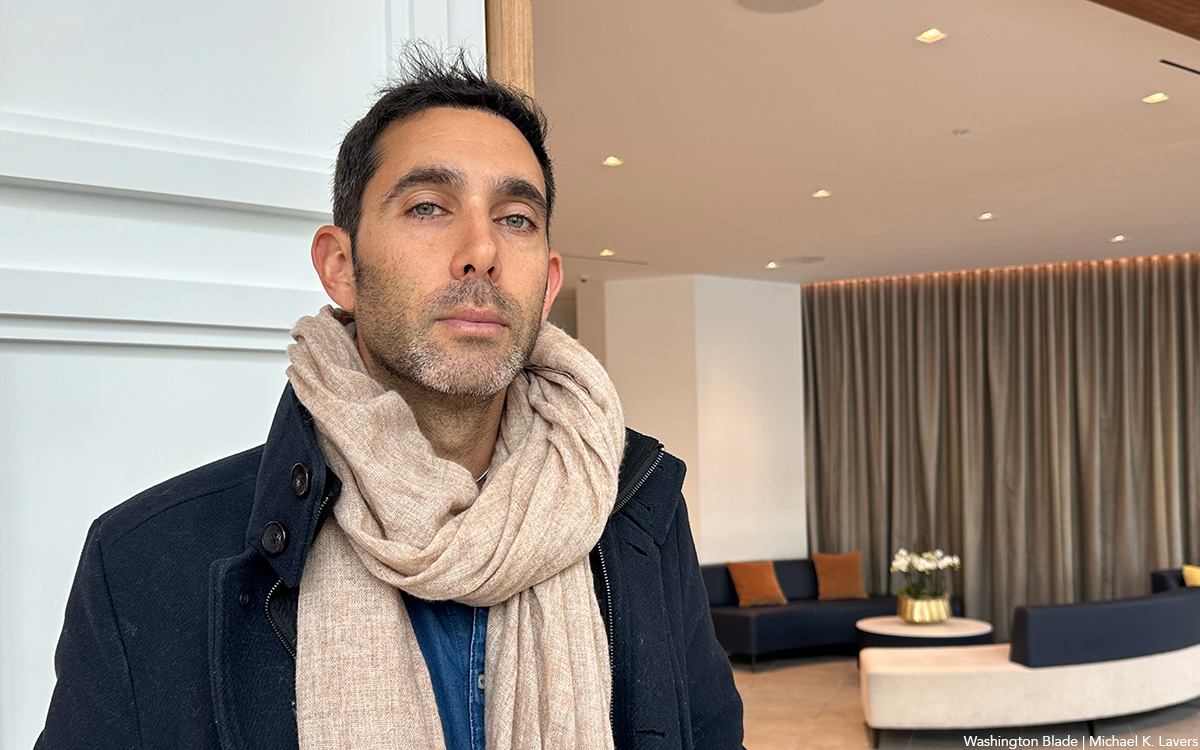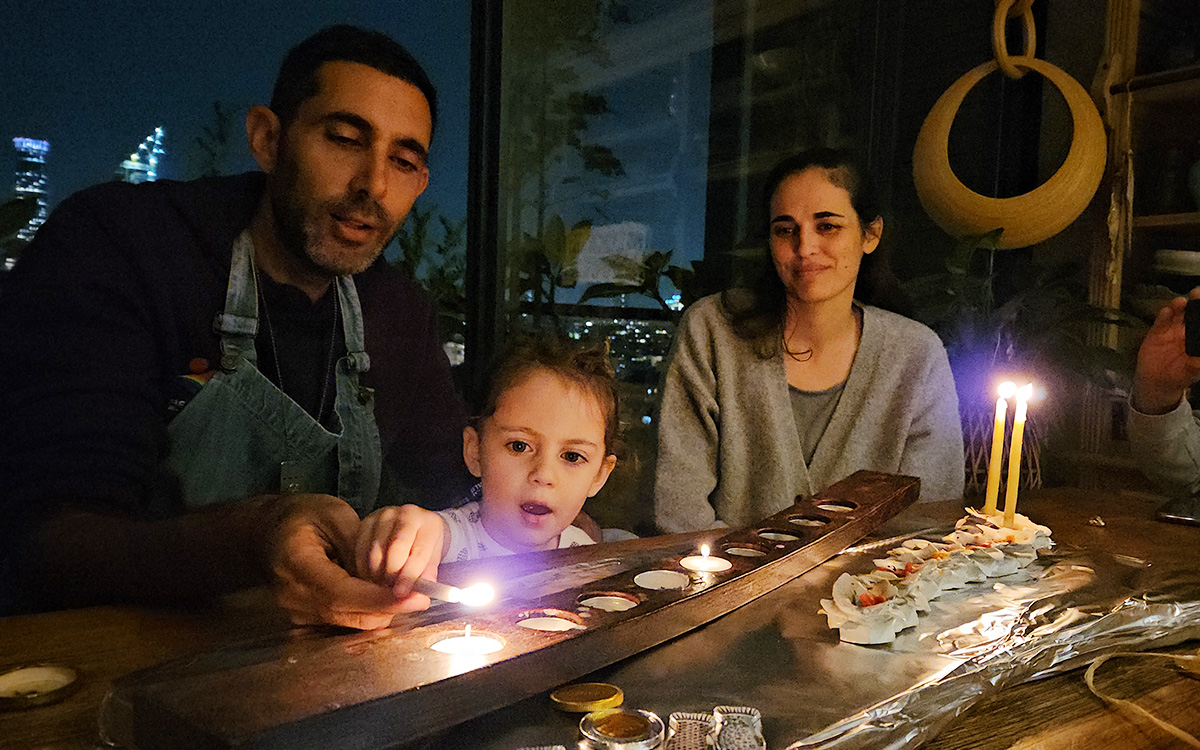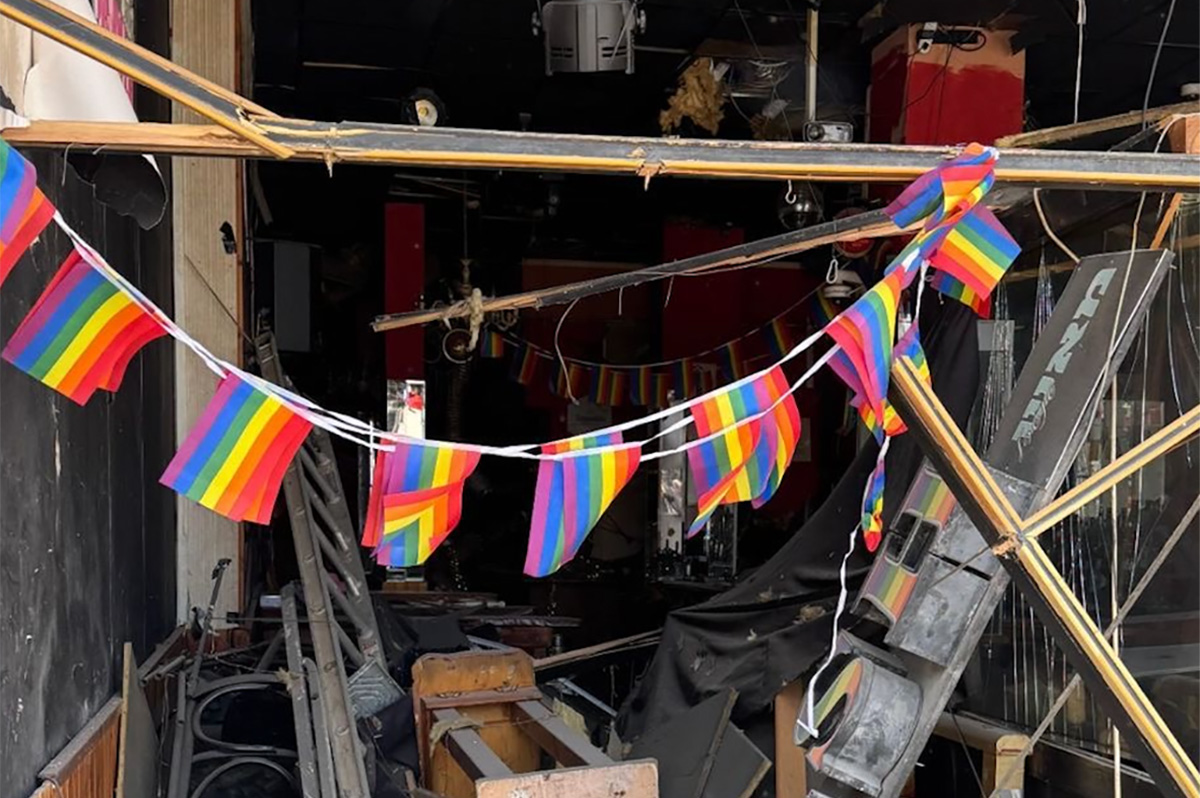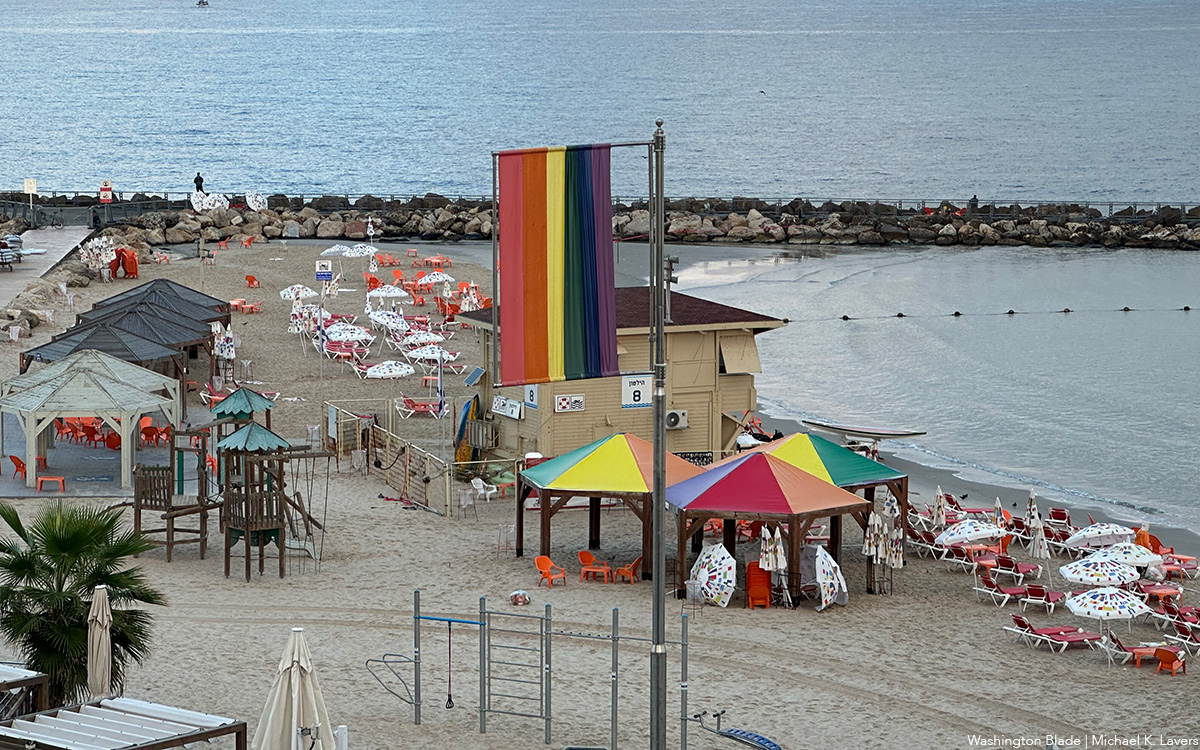Middle East
Brother of former Israeli hostage returns to D.C.
Gili Roman’s sister was held in Gaza Strip for 53 days

Yarden Roman-Gat, her husband, Alon Gat and their 3-year-old daughter, Geffen, were visiting her in-laws in Be’eri, a kibbutz that is near the border of Israel and the Gaza Strip, on Oct. 7, 2023.
Hamas shortly after 6 a.m. launched a surprise attack against communities in southern Israel from the Palestinian enclave it governs. Four militants placed Roman-Gat and her family into a car with two other Be’eri residents. They jumped out of it as it approached Gaza. Roman-Gat handed her daughter to her husband and they ran away.
The group the U.S. has designated a terrorist organization held Roman-Gat hostage in Gaza until her release on Nov. 29. Her brother, Gili Roman, a gay teacher and member of Israel’s Nemos LGBTQ+ Swimming Club who lives in Tel Aviv, returned to D.C. last week.
“She’s doing well,” Roman told the Washington Blade on Jan. 18 during an interview at a hotel near Union Station.
Roman-Gat spoke to “60 Minutes” less than a month after her release. Roman shared with the Blade details about his sister’s time in captivity.
He said she was alone, with three men guarding her.
“For 53 days she was observed and subjected to the will of three guys,” said Roman. “We are relieved because she was not abused, and we know that other people were abused and violently treated. This is not her case, but it was still a very traumatic experience.”
Militants on Oct. 7 killed her mother-in-law and kidnapped her sister-in-law, Carmel Gat, who remains in Gaza.
Roman said his sister learned militants had murdered her mother-in-law when she overheard “a very small” part of a song on Israeli radio that had been dedicated to her.
“This is how she found out that she had been murdered, that her sister-in-law is still a hostage,” Roman told the Blade. “Since they didn’t talk about her daughter and her husband, she concluded that they are alive.”
He said the men who held his sister hostage were members of Hamas and were religious. Roman told the Blade that some of them had university degrees and they explained to Roman-Gat why she had been kidnapped.
“She was a tool of war,” said Roman. “They told her many times it is not about Gaza and it’s not about Palestine. It’s not about the Palestinians.”
“The only reason that they’re keeping her is for the global fight for Islam, is a sort of global jihad,” he added. “Of course, they do not expect to get a Muslim empire, now. She’s just a tool in the long run ambition of them to have a Muslim empire around the world. This is pretty harsh, and they constantly told her that. This is the kind of extremism that she lived in and had to protect herself (from.)”
Roman said they also forced his sister to wear a hijab.
“She said it became her only shield,” he told the Blade.
Roman said his sister didn’t realize she was going to be released until shortly before it happened. Roman told the Blade the militants wanted her to change out of the hijab she had been wearing and to appear happy, but “she wasn’t willing to do that.”
Roman-Gat reunited with her daughter, husband and her family at a Tel Aviv hospital a few hours after her release.
“It was super exciting,” recalled Roman. “It’s like the birth of somebody you already know … it was very, very moving.”

The Israeli government has said Hamas militants killed roughly 1,200 people on Oct. 7, including at least 260 partygoers and others at an all-night music festival in Re’im, a kibbutz that is a few miles southwest of Be’eri. Carmel Gat is among the roughly 130 people who Hamas continues to hold hostage in Gaza.
The Hamas-controlled Gaza Health Ministry says more than 25,000 people have died in the enclave since the war began. Israel after Oct. 7 cut electricity and water to Gaza and stopped most food and fuel shipments.
Hezbollah, which the U.S. and Israel have designated a terrorist organization, has launched rockets from Lebanon into northern Israel.
The Houthis in Yemen have attacked commercial ships in the Red Sea since Oct. 7. The U.S. and the U.K. this month launched air strikes against the Iran-backed rebel group.
Roman told the Blade that many Israelis do not feel safe in their own country.
“We are all feeling so fragile,” he said.
Roman said his sister thinks that “somebody could take me” when she is on the street.
“I told her I feel exactly the same thing … like somebody can take my family and I will not see them for 100 days and I will not see them anymore,” Roman told the Blade.
He also pointed out more than 100,000 people have been displaced from southern and northern Israel since Oct. 7.
“We are under severe attacks from the north as well,” said Roman. “People are displaced. They don’t know when they are going to go back home. They know some of their houses have been attacked, demolished, bombarded.”
Roman noted Israelis who live near the West Bank are also concerned “their towns are going to be infiltrated” by militants who have dug tunnels. He also said there are reports of hostages and Israel Defense Forces soldiers killed “almost every day.” (The IDF on Monday said 24 soldiers were killed in Gaza.)
“We are feeling overwhelmed with fear and anxiety,” said Roman.
The International Court of Justice earlier this month heard legal arguments in South Africa’s case that accuses Israel of committing genocide against Palestinians in Gaza. Israeli Prime Minister Benjamin Netanyahu, meanwhile, is under increased pressure to secure the release of the remaining hostages.
“[It’s] hard to answer,” Roman said in response to the Blade’s question about whether the Israeli government has done enough to secure the hostages’ release.
Roman spoke with the Blade after he and other hostages’ relatives met with Senate Majority Leader Chuck Schumer (D-N.Y.), U.S. Sens. Joni Ernst (R-Iowa) and Ben Cardin (D-Md.) and other lawmakers on Capitol Hill. Roman and his cousin also had a private meeting with U.S. Sens. Bernie Sanders (I-Vt.) and Elizabeth Warren (D-Mass.).
“They were so attentive, so reasonable, so supportive,” said Roman, referring to the meeting with Sanders and Warren.
No ceasefire until all hostages are released
Roman was in D.C. days before A Wider Bridge brought a group of LGBTQ activists from the U.S. to Israel.
Today we visited Kibbutz Kfar Aza with a delegation of #LGBTQ activists from the United States in order to bear witness to the atrocities of October 7. It was a strong reminder for the values we are fighting for, the values that define us in contrast to our enemies, and most… pic.twitter.com/xX14A8JkkC
— Elad Strohmayer 🎗️ (@EladStr) January 23, 2024
The trip coincided with growing calls for a ceasefire in Gaza.
“The genocide in Gaza and violent attacks in Israel and Palestine must end,” said the National LGBTQ Task Force ahead of its annual Creating Change conference that took place last week in New Orleans.
Roman told the Blade he was afraid to walk in public while holding a poster with Gat’s picture on it because people “screamed at me, commented on it” when he was in New York.
“They don’t see me as a person,” said Roman. “I don’t think they see Carmel or Yarden as a person. They don’t see them as people. They see them as what Hamas tried to make them, a tool of war.”
“You have many people who are not on our side, who are justifying the fact that people have been murdered, that people have been raped, slaughtered, taken hostage,” he added.
Roman also said there cannot be a ceasefire until Hamas releases all of the hostages.
“There might be a ceasefire if all the hostages will be released,” he said. “The hostages are key.”
Israel
Activist recalls experience in Tel Aviv after Israel-Iran war began
Marty Rouse was part of Jewish Federations of North America Pride mission

A long-time activist who was in Israel last month when its war with Iran began has returned to D.C.
Marty Rouse traveled to Israel on June 6 with the Jewish Federations of North America. The 5-day mission ended the night before the annual Tel Aviv Pride parade was scheduled to take place.
Mission participants met with Israeli President Isaac Herzog and several LGBTQ activists in Tel Aviv and Jerusalem. They visited the Western Wall, the Nova Music Festival site, and Nir Oz, a kibbutz in southern Israel that is less than a mile from the country’s border with the Gaza Strip. Mission participants also visited Sderot, a city that is roughly a mile from the Hamas-controlled enclave, a veterans rehabilitation facility, a new LGBTQ health center and the Aguda: The Association for LGBTQ Equality in Israel in Tel Aviv.
Hamas militants on Oct. 7, 2023, killed upwards of 360 partygoers and kidnapped dozens more at the music festival that was taking place at a campground near Re’im, a kibbutz that is roughly 10 miles southwest of Nir Oz. The militants killed or took hostage nearly a quarter of Nir Oz’s residents. They also took control of Sderot’s police station.

Tel Aviv Deputy Mayor Chen Arieli spoke at the mission’s closing party that took place at the Sheraton Grand, a hotel that overlooks Tel Aviv’s beachfront, on June 12.
Rouse and other mission participants planned to stay in Tel Aviv for the Pride parade, which was scheduled to take place the following day. He and Gordie Nathan, another mission participant who lives in Palm Springs, Calif., had checked into a nearby hotel that was less expensive.
“We said our farewells,” recalled Rouse when he spoke with the Washington Blade in D.C. on June 24. “We went to our hotels, and we get the warning, and then all hell broke loose.”
Israel early on June 13 launched airstrikes against Iran that targeted the country’s nuclear and military facilities.
Rouse said mission organizers told him and other participants who remained in Tel Aviv to meet at the Sheraton Grand for breakfast and dinner — Israel’s airspace was closed in anticipation of an Iranian counterattack, and authorities cancelled the Pride parade.
He said he went to bomb shelters at least twice a night for three nights.
Israel’s Home Front Command during the war typically issued warnings about 10 minutes ahead of an anticipated Iranian missile attack. Sirens then sounded 90 seconds before an expected strike.
Rouse and Nathan walked to the Sheraton Grand on June 13 when the Home Front Command issued a 10-minute warning. They reached the hotel in a couple of minutes, and staff directed them to the bomb shelter.
“You know to walk slowly, everything’s fine,” recalled Rouse. “You get 10 minutes, so everything was fine when the alarm goes off.”
Rouse described the Sheraton Grand shelter as “well lit” with WiFi, a television, and air conditioning. He was watching an Israeli television station’s live coverage of the Iranian missile attack when he saw one hit an apartment building in the Tel Aviv suburb of Ramat Gan.
A 74-year-old woman died and her boyfriend was seriously injured.
“I go over to look at the TV, just to watch,” recalled Rouse. “All of a sudden, you watch, and you see one bomb go and land and explode in Tel Aviv on TV. It landed and blew up.”
“I was like, okay, this is real, and so that was scary,” he added.
Rouse said the bomb shelter in the hotel where he and Nathan were staying after the mission ended was far less comfortable.
“It was dark. It was humid. It was hot. It was very uncomfortable,” said Rouse. “You really felt alone.”

Rouse and nearly everyone else on the mission who were in Tel Aviv when the war began left Israel on June 15. They boarded buses that took them to the Jordanian capital of Amman, which is a roughly 2 1/2-hour drive from Tel Aviv through the West Bank.
Rouse described the trip as “like a field trip” until they drove across the Jordan River and arrived at the Jordanian border crossing.
“You walk into this room, and instead of being in a well air-conditioned airport, you’re in this hot, humid, small place in the middle of the desert, packed with people, and those big, large, loud fans and pictures of military people on the walls,” he said. “It was almost like a Casablanca kind of feeling.”
Rouse said Jordanian authorities brought mission participants through customs in groups of 10. A Jewish Federations of North America liaison from Amman who previously worked as a tour guide for A Wider Bridge — a group that “advocates for justice, counters LGBTQphobia, and fights antisemitism and other forms of hatred” — went “behind closed doors” to ensure everyone was able to enter the country.
“It took a really long time,” Rouse told the Blade.

Mission participants arrived in Amman a short time later. They checked into their hotel and then had dinner at a restaurant.
“Now we feel like we’re safe and we’re in Amman,” recalled Rouse. “We’re sitting outside having a beautiful dinner.”
Iranian missiles passed over Amman shortly after Rouse and the other mission participants had begun to eat their dessert. They went inside the restaurant, and waited a few minutes before they boarded busses that brought them back to their hotel.
“No one was openly freaking out, which I was surprised by,” said Rouse.
The group was scheduled to fly from Amman to Cairo at 11 p.m. local time (4 p.m. ET) on June 16. They visited Jerash, an ancient city north of Amman, before their flight left Jordan.
“[The Jerash trip] actually took our minds off of everything,” said Rouse.
A Jewish Federations of North America contact met Rouse and the other mission participants at Cairo’s airport once their flight landed. Rouse arrived at JFK Airport in New York on June 17.
Trump-announced ceasefire ended 12-day war
President Donald Trump on June 23 announced a ceasefire that ended the 12-day war.
The U.S. three days earlier launched airstrikes that struck three Iranian nuclear sites. The ceasefire took effect hours after Iran launched missiles at a U.S. military base in Qatar.
Iran said the war killed more than 900 people in the country.
The Associated Press notes Iranian missiles killed 28 people in Israel. One of them destroyed Tel Aviv’s last gay bar on June 16.
The war took place less than two years after Oct. 7.
The Israeli government says Hamas militants on Oct. 7, 2023, killed roughly 1,200 people on that day when it launched its surprise attack on the country. The militants also kidnapped more than 200 people.
The Hamas-controlled Gaza Health Ministry says Israeli forces have killed nearly 55,000 people in the enclave since Oct. 7. Karim Khan, the International Criminal Court’s chief prosecutor, has said Israeli Prime Minister Benjamin Netanyahu and former Hamas leader Yahya Sinwar, who the IDF killed last October, are among those who have committed war crimes and crimes against humanity in Gaza and Israel.

Rouse upon his return to the U.S. said he “was never as aware of the comfort of another human being than I was during that time.” Rouse affectionately called Nathan his “bomb shelter boyfriend” and even questioned the way he reacted to the missile alerts.
“He’s sitting on the edge of the bed and he goes, okay, I’m going to put on my socks and my shoes, and I say, really? You’re going to put on your socks,” Rouse told the Blade. “The fact that I was nervous, that putting on socks might have changed the direction of our lives, to me was like I can’t believe I said that to him.”
Rouse quickly added Nathan helped him remain calm.
“If I was by myself, those nights would have been long enough,” said Rouse. “It’s a totally different feeling to be with another human that you know than to be by yourself.”

Rouse also praised the Jewish Federations of North America.
“JFNA really sprung into action and started to figure out all options to get us all safely home,” said Rouse. “It was all about logistics. Staff worked around the clock identifying and then mobilizing to get us back to the states. It was a great team effort and I know I speak for everyone in expressing our deep appreciation for their dedication to getting us safely home.”
Israel
Iranian missile destroys Tel Aviv’s last gay bar
Mash Central is a few blocks from US Embassy

An Iranian missile on June 16 destroyed a gay bar in Tel Aviv, Israel.
The missile struck Mash Central, which is a few blocks from the U.S. Embassy on Allenby Street, and surrounding buildings. Israeli sources confirmed to the Washington Blade that Mash Central was the only gay-specific bar in Tel Aviv.
“Iran’s missile strike yesterday destroyed Tel Aviv’s only dedicated gay bar,” reads one Instagram post with pictures from inside the bar. “This place provided a safe space for minorities to express themselves — now it’s trashed.”
Mash Central describes itself as Tel Aviv’s “last gay bar standing,” even though the city promotes itself as one of the world’s most LGBTQ-friendly cities.
Israel on June 13 launched airstrikes against Iran that targeted the country’s nuclear and military facilities. Iran since the war began has launched hundreds of missiles towards Israel.
Tel Aviv’s Pride parade was scheduled to take place on June 13, but authorities cancelled it. Caitlyn Jenner, who was to have been the event’s guest of honor, is among those who were stranded in Israel after the war began.
Israel
Tel Aviv Pride parade cancelled after Israel attacks Iran
Caitlyn Jenner was to have been guest of honor

Tel Aviv authorities on Friday cancelled the city’s Pride parade after Israel launched airstrikes against Iran.
The Associated Press notes the Israeli airstrikes targeted nuclear and military facilities in Iran. Reports indicate the airstrikes killed two top nuclear scientists and the leader of Iran’s Revolutionary Guard.
Iran in response to the airstrikes launched more than 100 drones towards Israel. The Israel Defense Forces said it intercepted them.
The Tel Aviv Pride parade had been scheduled to take place on Friday. Caitlyn Jenner was to have been the event’s guest of honor.
Authorities, in consultation with local LGBTQ activists, last year cancelled the Tel Aviv Pride parade out of respect for the hostages who remained in the Gaza Strip after Oct. 7. Jerusalem’s annual Pride parade took place on June 5.















